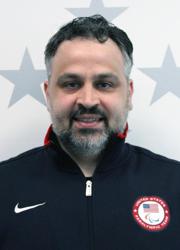
The Parafencing National Team Coach, Zeljkovic was the head coach of the 2017 Wheelchair World Championship Team and has been involved with the National Team since 2010. He is also the head coach at Zeljkovic Fencing Academy.
How did you become interested in fencing? What about the sport attracted you and made you want to spend your life involved in the sport?
After several sports that I tried in Serbia, one day my father Dusan told me that the next day we are going to see some other sport that doesn't include ball and is not karate or aikido. All night I was thinking what is sport that he is going to show me. He took me to Red Star sports club, that is my favorite club in all sports and he introduced me to fencing. As soon as I heard the sounds of the blades crossing each other, I became fascinated and in love with this sport.
How did you start coaching?
I started coaching in 1994 in the fencing club Red Star in Belgrade, the capital city of Serbia. My club had a very difficult time and we lost our coach because the club didn't have money for his salary. I was the oldest fencer and I started to coach all my teammates volunteering.
What are characteristics of a successful fencing coach?
There are several characteristics of a successful coach. Fencing coach needs to have knowledge of fencing sport. Usually we say coach is like wine. They are getting better with the years of experience. They need to have patience that is displayed through their own self-control and discipline. That will transfer to his students, assistant coaches and parents and ultimately lead to improved performance by the team. Coach need to show leadership. Being a good leader starts with setting and obeying rules and is displayed through always attending practice, leading by example, having a positive attitude and showing respect for the performance of your team, even when it's far from perfect.
What are some ways you measure progress in your athletes?
Progress in fencing is not measured only with medals that athletes are wining. It is measured in applying certain actions or tactics that student is practicing with his coach.
What phrases do you say most often while coaching, what "buzz words" do you find you use to communicate to your athletes?
I usually try to point out how important to focus in every action and for them to trust and believe in themselves.
Please share your practice philosophy in 2-3 sentences.
I know it might sound like cliché but perfect practice really make you perfect. And talent is only 5% of your success. The rest is hard work.
Please share any insight into coaching para athletes? Any differences beyond the physical ability differences from coaching able body fencers?
The biggest challenge is to adjust actions to match physical abilities of para athlete. They are all facing specific physical restrictions and the coach is the one who is going to try to find certain movements and actions that will make them into successful fencer.
What advice would you give a coach who has never worked with a wheelchair fencer but has a wheelchair athlete looking to learn how to fence?
Do not be afraid to help someone and learn from your athlete; it can be an amazing experience for both of you to become better.
Date Created: February 2018, Updated August 2019